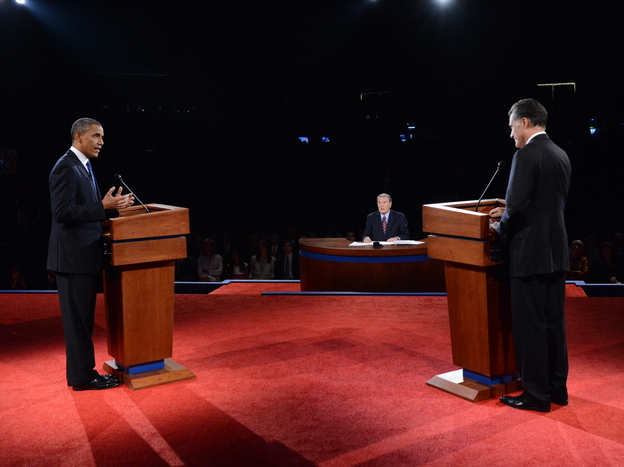Every day, the faux battle continues – party vs. party, conservative vs. liberal, etc. – frustrating the country and its citizens. Issue after issue becomes kindling for the sordid fire whose smoke is the stuff of political and legislative gridlock; they are talked at, not about. Those who should lead instead examine polls and rally their “bases”, and those who seek meaningful change are mocked or scorned. Blame is plentiful, progress is scarce and, more importantly, truth is nearly absent.
Interestingly, it seems the political class, with few exceptions, prefers this. Those furthest left or right tug at each other, accomplishing nothing, while “moderates” posture for loose votes, with all honing their pitch as either the “champions of their view” or the “voices of reason.” While the political class, well, politics, they ignore the concerns of voters and citizens.
For example, the economy and jobs are the number 1 issues with the American electorate today. This was also the case in 2008 , 2009, 2010, 2011, and 2012. However, since the last general election, the political class have devoted most of their time to bickering over gun control and immigration reform, two issues about which Americans are largely indifferent.
The last major effort by the 536 Keystone Cops in D.C. (435 Congressmen, 100 Senators, and 1 President) to impact the economy and jobs was the 2009 “Stimulus” Bill. Criticism and praise aside, the Labor Force Participation Rate, or the proportion of the “working age” population that is willing and able to work and is either employed or actively seeking employment, is down nearly 2.5 percentage points since January 2009, to a 34-year low, and continues to decline. The current administration promised to add jobs. However, since January 2009, 9.5 million Americans left the workforce instead. Compare that to the 1.2 million jobs created during the current administration. Not only does the political class pay little attention to the citizens’ concerns, when they do take action, it makes matters worse.
Yet, the media provides regular reports of the improving economy and job market, bantering back and forth about the political implications. It would seem much of the press is more interested in political intrigue than in the political accountability of elected officials.
Meanwhile, 15% of Americans are in poverty, and that is likely a low-ball number. Food stamp enrollment has increased more than 70% since 2008, to a record near 48 million people. Thirty-three municipalities have filed for bankruptcy since 2010, including 7 cities. The national debt, which the government decries, even as deficit spending continues, has grown to 105% of annual GDP; under the previous administration, it only once went above 40%.
Instead of addressing these matters, the political class tells the nation that a decrease in the government’s ever-increasing spending plans is somehow a budget cut, lies about the events in which four Americans, including an US Ambassador, were killed on American soil in Libya, and throws itself into a frenzy of self-investigation.
American voters, by a 7 to 2 margin, view the economy and unemployment as bigger issues than the multiple Obama scandals. Apparently, all that dust in the air has not blurred their of what matters to them.
Yet, public discourse often demonstrates a kindergarten level of sophistication: blaming racism for the government’s ills, blaming the last administration for what’s wrong (even though the exculpatory information, about taxes, job creation, or the Great Recession is undeniable). And while people defend this president and bash his predecessor, or vice versa, they do nothing about a government that seeks more power while ignoring the people’s problems and priorities.
…and that is the real battle…
The American people are battling the federal government for control: of their lives and liberties; of identifying, defining, and addressing problems; of whether the American Experiment can continue, in any form, as the Founders delivered it to them. And the American people are losing.
As government power grabs increase (the administration recently issued Executive Orders which essentially nationalize state elections, plus a host of other things), Americans are witness to the most significant flaw in government today: the inability, or unwillingness, of one branch of government to check and balance another when it works against the people’s will.
Obamacare remains unpopular among voters, yet the Supreme Court essentially re-wrote to find it constitutional, and Congress has failed repeal it. For its part, the national press, instead of chiding the Legislative and Judicial Branches of government for failing to uphold the people’s will, mocks the attempts in Congress to do what their constituents want, even as those in government acknowledge Obamacare will be a “train wreck”. When the federal government misses multiple opportunities to do the people’s will, opting instead to increase its own power…”Houston, we have a problem…”
And that problem will snowball, as the federal government prepares to unleash the IRS to implement the health care law. When $20,000 per year becomes the least expensive health insurance option for a family of 5, making $120,000 per year (and that ain’t as much as you think with 3 kids), and failure to comply means quality time with the tax collector, what recourse will the American people have, after two branches of government have failed to protect them, and the third believes nothing is wrong…and controls the IRS?
Speaking of (no) recourse, let’s not forget the 23 Gun Control Executive Orders issued earlier this year, which include having doctors ask patients about guns in their homes, and encouraging a national health care database to authorize gun purchases. So if anyone plans armed resistance against the government, then they should buy their guns early and lie to their doctor about it.
And all the while, the government assures us that it has no tyrannical characteristics:
[youtube]http://www.youtube.com/watch?v=AIOF5R-7rx8[/youtube]
However, the founders who gave us a Constitution, had different thoughts. James Madison said, “The essence of Government is power; and power, lodged as it must be in human hands, will ever be liable to abuse.”
Does anyone else look at this government and not either feel abused, or fairly certain they might easily be abused?
And Thomas Jefferson said, “When governments fear people, there is liberty. When the people fear the government, there is tyranny.”
Does anyone else look at this government today with no fear of what it might do to them?
When you boil it all down…does anyone really not understand that the political battles that dominate the headlines are a head fake to distract from the real battle between the government and its people? And does anyone actually believe the people are winning?






